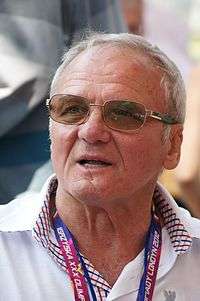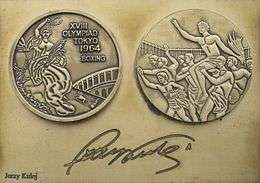Jerzy Kulej
Jerzy Zdzisław Kulej (Polish: [ˈjɛʐɨ ˈkulɛj]; 19 October 1940 – 13 July 2012) was a Polish boxer and politician.[1][2]
 Jerzy Kulej in 2011 | |||||||||||||||||||||||||||||
| Personal information | |||||||||||||||||||||||||||||
|---|---|---|---|---|---|---|---|---|---|---|---|---|---|---|---|---|---|---|---|---|---|---|---|---|---|---|---|---|---|
| Born | 19 October 1940 Częstochowa, Śląskie, Poland | ||||||||||||||||||||||||||||
| Died | 13 July 2012 (aged 71) Warsaw, Poland | ||||||||||||||||||||||||||||
| Height | 1.67 m (5 ft 6 in) | ||||||||||||||||||||||||||||
| Weight | 66 kg (146 lb) | ||||||||||||||||||||||||||||
| Sport | |||||||||||||||||||||||||||||
| Sport | Boxing | ||||||||||||||||||||||||||||
| Weight class | Light welterweight | ||||||||||||||||||||||||||||
| Club | Start Częstochowa Gwardia Warszawa | ||||||||||||||||||||||||||||
Medal record
| |||||||||||||||||||||||||||||

Kulej was born in Częstochowa, Poland. At the Summer Olympics in 1964 he won a gold medal in the light welterweight division (<63.5 kg) defeating Yevgeny Frolov. In 1968,[3] he defended his title in a close match against a Cuban boxer Enrique Regüeiferos becoming the only Polish boxer to ever win two Olympic gold medals. He also twice won a gold medal at the European Amateur Championships in 1963 and 1965, and won a silver medal in 1967.[4] He had a record of 317 wins, 6 draws and 25 losses.
In 1976, he made an appearance in a movie Przepraszam, czy tu biją? directed by Marek Piwowski.[5] In 1995, he received the Aleksander Reksza Boxing Award.[6]
In his later years he became a politician representing various parties over the time. In 2001, as a member of Democratic Left Alliance for electoral district of Warsaw he became a member of the Polish parliament (the Sejm) and server to 2005. He was a boxing commentator for Polish TV station Polsat Sport.
In December 2011, he suffered a massive heart attack. While in recovery, he learned that he suffered from an eye melanoma that was, in the end, the direct cause of his death in Warsaw on 13 July 2012 at the age of 71.
Olympic results
1964 - Tokyo
- Round of 64 – bye
- Round of 32 – Defeated Roberto Amaya (Argentina) by decision, 5–0
- Round of 16 – Defeated Richard McTaggart (Great Britain) by decision, 4–1
- Quarterfinal – Defeated Iosif Mihalic (Romania) by decision, 4–1
- Semifinal – Defeated Eddie Blay (Ghana) by decision, 5–0
- Final – Defeated Yevgeny Frolov (Soviet Union) by decision, 5–0
1968 - Mexico City
- Round of 64 – bye
- Round of 32 – Defeated János Kajdi (Hungary) by decision, 3–2
- Round of 16 – Defeated Giambattista Capretti (Italy) by decision, 4–1
- Quarterfinals – Defeated Peter Tiepold (East Germany) by decision, 3–2
- Semifinals – Defeated Arto Nilsson (Finland) by decision, 5–0
- Final – Defeated Enrique Requeiferos (Cuba) by decision, 3–2
References
| Wikimedia Commons has media related to Jerzy Kulej. |
- Aneta Hołówek (13 July 2012). "Nie żyje Jerzy Kulej – najbardziej utytułowany polski bokser". Polskie Radio. Retrieved 13 July 2012.
- Jerzy Kulej Archived 20 December 2014 at the Wayback Machine. sports-reference.com
- "Olympic Games Boxing Results 1904 to 2000". Archived from the original on 23 February 2008. Retrieved 11 January 2010.CS1 maint: BOT: original-url status unknown (link). sasktelwebsite.net
- European Championships. Amateur-boxing.strefa.pl. Retrieved on 6 August 2014.
- Excuse Me, Is It Here They Beat Up People? (1976). IMDb
- Nagroda Im. Aleksandra Rekszy. Bokser.org (13 November 2009). Retrieved on 6 August 2014.
External links
- Jerzy Kulej on IMDb